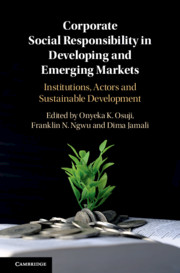 Corporate Social Responsibility in Developing and Emerging Markets
Corporate Social Responsibility in Developing and Emerging Markets from Part I - Institutions, CSR Conceptualizations and Sustainable Development
Published online by Cambridge University Press: 18 December 2019
Institutional theory has been used in the study of CSR in developing countries. The chapter offers an insightful new conceptual framework that shows how differing expressions of CSR in developing countries are shaped by the institutional dimensions of the developing country’s institutional context. The chapter proposes a review of the application of institutional theory for CSR in developing countries and how the different comparative CSR frameworks have been used mostly for developed countries. Rather than using existing comparative institutional models such as Varieties of Capitalism (VOC) or National Business System (NBS), the chapter proposes a new theoretical lens to explore CSR in developing countries. Varieties of institutional systems (VIS) aims to expand the conversation on comparative institutional perspectives for CSR in developing countries. The chapter proposes a novel conceptual framework that combines Varieties of Institutional Systems (VIS) theoretical framework with the heterogeneous expressions of CSR in developing countries. This novel conceptual framework is used to explore which expressions of CSR should be implemented by firms in developing countries, depending on the VIS institutional dimensions. Based on the developing country’s institutional context and its institutional dimensions, described by the VIS framework, firms need to adopt a specific expression of CSR in developing countries.
To save this book to your Kindle, first ensure no-reply@cambridge.org is added to your Approved Personal Document E-mail List under your Personal Document Settings on the Manage Your Content and Devices page of your Amazon account. Then enter the ‘name’ part of your Kindle email address below. Find out more about saving to your Kindle.
Note you can select to save to either the @free.kindle.com or @kindle.com variations. ‘@free.kindle.com’ emails are free but can only be saved to your device when it is connected to wi-fi. ‘@kindle.com’ emails can be delivered even when you are not connected to wi-fi, but note that service fees apply.
Find out more about the Kindle Personal Document Service.
To save content items to your account, please confirm that you agree to abide by our usage policies. If this is the first time you use this feature, you will be asked to authorise Cambridge Core to connect with your account. Find out more about saving content to Dropbox.
To save content items to your account, please confirm that you agree to abide by our usage policies. If this is the first time you use this feature, you will be asked to authorise Cambridge Core to connect with your account. Find out more about saving content to Google Drive.